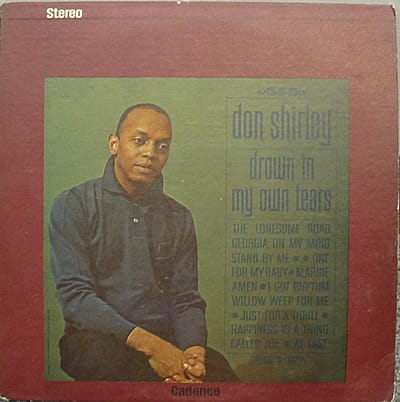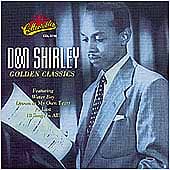 |
 |
 |
 |
Don
Shirley - Drown In My Own Tears
Cadence
CLP3057 [1962] Stereo CLP25057
|

AUDIO
NOTES This LP was recorded mono and stereo at the
Fine Recording Studios In New York on October 12th,
December 12th and December 14, 1961 with the
exception of I GOT RHYTHM, which was recorded on
July 13, 1960. Recording engineers George Piros and
John Quinn employed two Telefunken U-47 microphones
for piano pickup and one U·47 each for organ, cello,
bass and percussion.
The tapes were recorded directly on Ampex 300
recorders and the master lacquers were cut directly
from the original tapes by Claude Rie on a Neumann
lathe with a Neumann SX45 cutter for stereo and a
Neumann ES59 cutter for mono. Both cutters are flat
within 1 DB from 30 cycles to 18,000 cycles.
This high fidelity recording has been patterned to
the RIM curve and will give best results when
playback amplifiers are set for this curve.
Reissued with 5 additional Songs on
Collectable Golden Classics
-----

|
Side A
1. Drown In My Own Tears
(Henry Glover)
Jay & Cee Music Corp., BMI 2:14
Piano and Organ: Don Shirley; Bass: Ken Fricker; Cello: Juri Taht; Percussion:
Ted Sommer
2. Margie
(B. Davis -- C. Conrad -- J.R. Robinson)
Mills Music, Inc., ASCAP 4:25
Piano: Don Shirley; Bass: Ken Fricker. Cello: Donald Anderson
3. Stand By Me
(B.E. King -- E. Glick)
Trio, ADT, BMI 2:13
Piano and Organ: Don Shirley' Bass: Ken Fricker; Cello: Donald Anderson·
Percussion: Ted Sommer
4. Willow Weep For Me
(Ann Ronell)
Bourne Inc., ASCAP 5:09
Piano: Don Shirley; Bass: Ken Fricker· Cello: Donald Anderson
5. I Got Rhythm
(G. Gershwin -- I. Gershwin)
New World Music Corp., ASCAP 2:12
Piano: Don Shirley; Bass: Ken Fricker' Cello: Juri Taht
6. Georgia On My Mind
(H. Carmichael -- S. Gorrel)
Peer International Corp., ASCAP 7:33
Piano: Don Shirley; Bass: Ken Fricker· Cello: Donald Anderson
Side B
1. The Lonesome Road
(G. Austin -- N Shilkret)
Paramount Music Corp., ASCAP 2:21
Piano and Organ: Don Shirley; Bass: Ken Fricker; Cello: Juri Taht· Percussion:
Ted Sommer
2. At Last
(M. Gordon -- H. Warren)
Warren Leo Feist Inc., ASCAP 4:02
Piano: Don Shirley; Bass: Ken Fricker. Cello: Donald Anderson
3. Amen
(Don Shirley)
Walbridge Co., BMI 4:00
Piano and Organ: Don Shirley; Bass: Ken Fricker; Cello: Donald Anderson·
Percussion: Ted Sommer
4. Happiness Is A Thing Called Joe
(H. Arlen -- E. Y. Harburg)
Leo Feist Inc., ASCAP 3:52
Piano and Organ: Don Shirley
5. One For My Baby (And One More For The Road)
(J. Mercer - H. Arlen)
Edwin H. Morris & Co., Inc., ASCAP 5:12
Piano: Don Shirley; Bass: Ken Fricker· Cello: Donald Anderson; Percussion: Ted
Sommer
6. Just For A Thrill
(L. Armstrong - D. Raye)
Leeds Music Corp., ASCAP 4:57
Piano: Don Shirley; Bass: Ken Fricker· Cello: Donald Anderson; Percussion: Ted
Sommer
|
"In these songs I'm coming back to the roots," Don
Shirley explained over the long-distance telephone.
And what are these roots? They are the misery, the
passion and the pathos, the surge toward freedom and
the flashes of pure, unadulterated,
living-for-the-moment joy which, welded into one,
have resulted in what has been commonly called "that
down-home" feeling.
This record is different
from others by Shirley--different maybe only in
spots-but there are enough spots so that its appeal
reaches out to more than the fascinated fans who
over the years have gathered to hear him in the
country's poshest night clubs, as well as to the
eminent musicologists who have acclaimed his work in
concert halls. There are within these tracks moments
of raw vigor, of a kind of unbridled enthusiasm and
a "to-hell-with-what-they-might-be-thinking-back-at-the-Leningrad-Conservatory"
freedom that captures the aver· age human's raw
emotions. (When he was only nine, Don was invited to
study at Leningrad, and he spent a good part of his
youth there.) And yet there remains so much of Don
Shirley's superb musical taste and technique that
anyone who has followed his achievements will
immediately recognize who it is who is interpreting
songs Ray Charles has made famous, or offering
unique conceptions of the more sophisticated
melodies of Gershwin and Arlen.
That was quite a phone
call, the one alluded to back in the opening
sentence. When our telephone operator had asked for
"Mr. Don Shirley," the hotel operator had replied,
"we have a Doctor Shirley," which immediately
reminded us that Don had achieved three Ph.D's--in
music, psychology and liturgical arts-and also that
he speaks eight languages. Fortunately he spoke only
English as he offered such revelatory comments as:
"Trying to find any way
to play honestly and truthfully has been difficult."
He admitted, on this particular record, to sometimes
changing his point of view and "it was a revelation
in my case." But there still remained doubts about
the effect-more so than about the cause,
sociologically as well as musically.
Don had been expecting
the phone call and had prepared a statement. He
began reading: "It is only in his music, which
Americans are able to admire because a protective
sentimentality limits their understanding of it,
that the Negro in America has been able to tell his
story. It is a story which otherwise has yet to be
told and which no American is prepared to hear.
"Americans who evade, so
far as possible, all genuine experiences, have
therefore no way of assessing the experiences of
others and no way of establishing themselves in
relation to any way of life which is not their own.
Thus the idea of my music can be presented without
fear of contradiction, since no American has the
knowledge or authority to contest it and no Negro
has the voice.
"I happen to be the
living example of something I'm not able to identify
myself with." Shirley is an American Negro; yet both
his training and his upbringing have been
predominantly in the white man's world and much of
his youth was lived in Europe. Little wonder then,
as he said, "trying to find any way to play honestly
and truthfully has been difficult."
And yet, it is just this
sort of ambivalence that makes this the most
intriguingly diversified of all Don Shirley records.
Take the opening DROWN IN MY OWN TEARS (also called
I'll DROWN IN MY TEARS), certainly a return to the
roots with an earthy feeling reminiscent of Ray
Charles' famous
interpretation. To Shirley this is "gospel music.
Ray Charles Sings and plays like an honest, truthful
human being." Don plays both organ and piano. Which
came first? "The piano; then I overdubbed the
organ."
In MARGIE Shirley is
"trying to say something seriously and slowly."
Instead of resorting to the usual middle-tempoed,
business-man's bounce approach, Don plays the song
very slowly, emphasizing its pretty melodic line.
"I'm talking about how wonderful she is." As for the
breaks at the end of the
first sixteen bars of each chorus-"I don't want
anybody to think I've lost my sense of humor."
STAND BY ME is what Don
calls "a Negro gospel shout song," and he treats it
accordingly, complete with passionate rhythmic
urging from the organ. Though the song is most
commonly associated with recording artist Ben E.
King, Don expresses great admiration for the way
Damita Jo sang the
"answer" song containing the same melody, I'll STAND
BY YOU. The unusual rhythmic effect, by the way,
comes from a Latin-American percussion instrument
called a scraper.
WILLOW WEEP FOR ME
displays Shirley's great breadth of interpretation
of a popular standard. Here, more than on any other
selection on this record, his classical training and
technique seep through, as expressed by his
emotional use of dynamics and his magnificent
articulation. The approach
varies: the first chorus florid and majestic, the
second tender and warm, the first three-quarters of
the third gay and swinging, with the final portion
reverting to a combination of the tender and the
majestic.
George Gershwin's I GOT
RHYTHM has never been approached before as it is
here. "I went back to the source," Don explains.
"Gershwin had done so too. He was very sincere about
his pop tunes. The song is based on an old Negro
spiritual called 'You Must Come In At The Door.' The
lyrics go
'My lawd is so high, you can't get over it;
My lawd is so low, you can't get under it;
My lawd is so wide, you can't get around it;
You must come in at the door.' "
Don plays the song slowly, with deep feeling, and
the effect is further enhanced by the very simple,
almost gospel-like rhythmic pattern set by the bass.
In GEORGIA ON MY MIND,
Don thinks of "Georgia" as a woman instead of as a
southern state. Ray Charles must have felt the same
way, Don believes, when he made his famous record of
this Hoagy Carmichael classic. "This way the song
puts me in a better frame of mind and helps me
create the scene or situation I'm trying to
portray." The effect is heightened by the lovely,
legato countermelody played by the cello.
The second side starts
with an unusual rendition of THE LONESOME ROAD. But
here the approach is not, as one might expect,
simple and earthy. Instead, Don embellishes the
standard with a stimulating rhythmic effect that
seems to be in 6/4 time and "can be, if you feel it
that way. But to me, I hear it in 4/4," says
Shirley. You figure it out.
AT LAST, a wonderfully
moody effort, has nothing at all to do with the
famous Glenn Miller interpretation. "The opening is
plain Mahalia Jackson." Here, as Don puts it, "I
play words." The words are romantic and so is Don's
playing. "But at the end I play sort of a joke when
I interpolate HUMORESQUE." Again, as seriously as he
takes it, he doesn't want anybody to think he's lost
his sense of humor.
In AMEN Don admits to a
revival meeting set-up, in which the right hand
plays the part of the preacher and the bass and
percussion answer with amen shouts. The tune, an
original by Shirley based on the blues, has what Don
likes to call a "moaning" feeling.
Harold Arlen's HAPPINESS
IS A THING CALLED JOE offers Shirley with no
rhythmic support at all. The song was introduced by
Ethel Waters, then revived by Frances Wayne when she
sang in Woody Herman's band. Don's first chorus is
out of tempo and heightens the subtle, rhythmic
effect of the in-tempo second. "I met Frances some
years ago," he recalls.
"She sang this song so
wonderfully-especially those lines, 'It's Christmas
everywhere.''' (They occur from the 22nd through the
24th bar of the song.)
The following Arlen opus,
ONE FOR MY BABY, features a catchy rhythmic bass
pattern conceived by Shirley and an especially
effective ending that sets the futile mood of the
song. Shirley has always admired Arlen for his
musical training and his jazz experiences, both of
which are reflected in his songs.
JUST FOR A THRILL again
reflects Don's enthusiasm for Ray Charles, replete
as it is with down-home feelings.
In these dozen
selections, Don Shirley has achieved an amazing
variety of musical moods. Maybe, like the true arist
[sic] he is, he can never be completely satisfied
with what he has created. So be it. But to us, on
the outside of Don Shirley, for whom these
performances carry so much conviction and validity,
his contention that finding any way to play honestly
and truthfully is difficult, must, by the very
evidence contained herein, fall on deaf ears. But
never so his music!
GEORGE T. SIMON |
|
|
|

